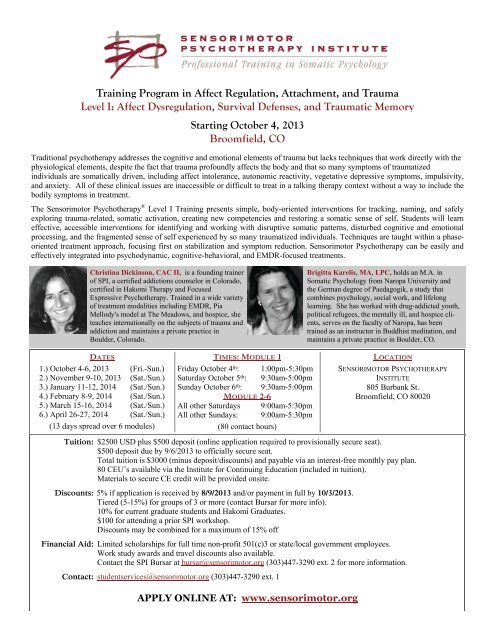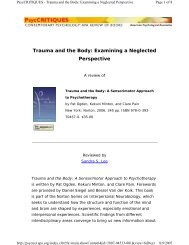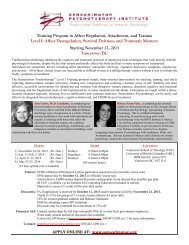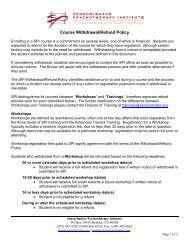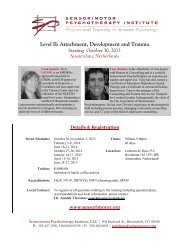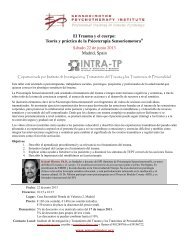to view training flyer - Sensorimotor Psychotherapy Institute
to view training flyer - Sensorimotor Psychotherapy Institute
to view training flyer - Sensorimotor Psychotherapy Institute
Create successful ePaper yourself
Turn your PDF publications into a flip-book with our unique Google optimized e-Paper software.
Training Program in Affect Regulation, Attachment, and Trauma<br />
Level I: Affect Dysregulation, Survival Defenses, and Traumatic Memory<br />
Starting Oc<strong>to</strong>ber 4, 2013<br />
Broomfield, CO<br />
Traditional psychotherapy addresses the cognitive and emotional elements of trauma but lacks techniques that work directly with the<br />
physiological elements, despite the fact that trauma profoundly affects the body and that so many symp<strong>to</strong>ms of traumatized<br />
individuals are somatically driven, including affect in<strong>to</strong>lerance, au<strong>to</strong>nomic reactivity, vegetative depressive symp<strong>to</strong>ms, impulsivity,<br />
and anxiety. All of these clinical issues are inaccessible or difficult <strong>to</strong> treat in a talking therapy context without a way <strong>to</strong> include the<br />
bodily symp<strong>to</strong>ms in treatment.<br />
The Sensorimo<strong>to</strong>r <strong>Psychotherapy</strong> ® Level I Training presents simple, body-oriented interventions for tracking, naming, and safely<br />
exploring trauma-related, somatic activation, creating new competencies and res<strong>to</strong>ring a somatic sense of self. Students will learn<br />
effective, accessible interventions for identifying and working with disruptive somatic patterns, disturbed cognitive and emotional<br />
processing, and the fragmented sense of self experienced by so many traumatized individuals. Techniques are taught within a phaseoriented<br />
treatment approach, focusing first on stabilization and symp<strong>to</strong>m reduction. Sensorimo<strong>to</strong>r <strong>Psychotherapy</strong> can be easily and<br />
effectively integrated in<strong>to</strong> psychodynamic, cognitive-behavioral, and EMDR-focused treatments.<br />
Christina Dickinson, CAC II, is a founding trainer<br />
of SPI, a certified addictions counselor in Colorado,<br />
certified in Hakomi Therapy and Focused<br />
Expressive <strong>Psychotherapy</strong>. Trained in a wide variety<br />
of treatment modalities including EMDR, Pia<br />
Mellody's model at The Meadows, and hospice, she<br />
teaches internationally on the subjects of trauma and<br />
addiction and maintains a private practice in<br />
Boulder, Colorado.<br />
Brigitta Karelis, MA, LPC, holds an M.A. in<br />
Somatic Psychology from Naropa University and<br />
the German degree of Paedagogik, a study that<br />
combines psychology, social work, and lifelong<br />
learning. She has worked with drug-addicted youth,<br />
political refugees, the mentally ill, and hospice clients,<br />
serves on the faculty of Naropa, has been<br />
trained as an instruc<strong>to</strong>r in Buddhist meditation, and<br />
maintains a private practice in Boulder, CO.<br />
DATES<br />
1.) Oc<strong>to</strong>ber 4-6, 2013 (Fri.-Sun.)<br />
2.) November 9-10, 2013 (Sat./Sun.)<br />
3.) January 11-12, 2014 (Sat./Sun.)<br />
4.) February 8-9, 2014 (Sat./Sun.)<br />
5.) March 15-16, 2014 (Sat./Sun.)<br />
6.) April 26-27, 2014 (Sat./Sun.)<br />
(13 days spread over 6 modules)<br />
TIMES: MODULE 1<br />
Friday Oc<strong>to</strong>ber 4 th :<br />
Saturday Oc<strong>to</strong>ber 5 th :<br />
Sunday Oc<strong>to</strong>ber 6 th :<br />
MODULE 2-6<br />
Tuition: $2500 USD plus $500 deposit (online application required <strong>to</strong> provisionally secure seat).<br />
$500 deposit due by 9/6/2013 <strong>to</strong> officially secure seat.<br />
Total tuition is $3000 (minus deposit/discounts) and payable via an interest-free monthly pay plan.<br />
80 CEU’s available via the <strong>Institute</strong> for Continuing Education (included in tuition).<br />
Materials <strong>to</strong> secure CE credit will be provided onsite.<br />
Discounts: 5% if application is received by 8/9/2013 and/or payment in full by 10/3/2013.<br />
Tiered (5-15%) for groups of 3 or more (contact Bursar for more info).<br />
10% for current graduate students and Hakomi Graduates.<br />
$100 for attending a prior SPI workshop.<br />
Discounts may be combined for a maximum of 15% off<br />
Financial Aid: Limited scholarships for full time non-profit 501(c)3 or state/local government employees.<br />
Work study awards and travel discounts also available.<br />
Contact the SPI Bursar at bursar@sensorimo<strong>to</strong>r.org (303)447-3290 ext. 2 for more information.<br />
Contact: studentservices@sensorimo<strong>to</strong>r.org (303)447-3290 ext. 1<br />
1:00pm-5:30pm<br />
9:30am-5:00pm<br />
9:30am-5:00pm<br />
All other Saturdays 9:00am-5:30pm<br />
All other Sundays: 9:00am-5:30pm<br />
(80 contact hours)<br />
APPLY ONLINE AT: www.sensorimo<strong>to</strong>r.org<br />
LOCATION<br />
SENSORIMOTOR PSYCHOTHERAPY<br />
INSTITUTE<br />
805 Burbank St.<br />
Broomfield, CO 80020
Sensorimo<strong>to</strong>r <strong>Psychotherapy</strong> <strong>Institute</strong><br />
Founded by Pat Ogden, Ph.D.<br />
Sensorimo<strong>to</strong>r <strong>Psychotherapy</strong> <strong>Institute</strong> is an educational organization dedicated <strong>to</strong><br />
the study and teaching of a somatic approach <strong>to</strong> clinical psychotherapy practice.<br />
Sensorimo<strong>to</strong>r <strong>Psychotherapy</strong> is a body-oriented talking therapy that integrates verbal<br />
techniques with body-centered interventions in the treatment of trauma, attachment,<br />
and developmental issues.<br />
SPI offers <strong>training</strong>s and workshops for psychotherapists and allied professionals in<br />
Sensorimo<strong>to</strong>r <strong>Psychotherapy</strong> and courses for body therapists on somatic resources.<br />
The courses taught by SPI are based on principles of mindfulness and mind/body/<br />
spirit holism and informed by contemporary research in neuroscience, attachment<br />
theory, trauma, and related fields.<br />
Pat Ogden, Ph.D., is a pioneer in somatic psychology having trained<br />
in a wide variety of somatic and psychotherapeutic approaches. She has<br />
34 years experience working with individuals and groups in diverse<br />
populations. She is first author of the groundbreaking book, Trauma<br />
and the Body: A Sensorimo<strong>to</strong>r Approach <strong>to</strong> <strong>Psychotherapy</strong> and is both<br />
founder and direc<strong>to</strong>r of Sensorimo<strong>to</strong>r <strong>Psychotherapy</strong> <strong>Institute</strong>. She is a<br />
clinician, consultant, international lecturer and trainer, co-founder of the<br />
Hakomi <strong>Institute</strong>, and on faculty at Naropa University. Currently she is<br />
working on her second book, The Body as Resource: Sensorimo<strong>to</strong>r<br />
Interventions for the Treatment of Trauma.<br />
“Sensorimo<strong>to</strong>r <strong>Psychotherapy</strong> is a<br />
conceptually elegant, powerfully<br />
effective body therapy that<br />
involves a broad reper<strong>to</strong>ire of<br />
somatic interventions specifically<br />
designed <strong>to</strong> help clients tap in<strong>to</strong><br />
the wisdom of their bodies.<br />
The SPI Training Program<br />
offers ingeniously taught<br />
intensive courses for clinicians<br />
seeking <strong>to</strong> deepen their<br />
understanding of the body.”<br />
Martha Stark, MD, author of<br />
Working with Resistance and<br />
Modes of Therapeutic Action<br />
Level I: Affect Dysregulation, Survival Defenses, and Traumatic Memory<br />
Curriculum | 80 contact hours<br />
Including the Body in <strong>Psychotherapy</strong> Practice<br />
How <strong>to</strong> track and name somatic experience and work with<br />
physical action.<br />
Trauma and the Body<br />
The role of the body in perpetuating PTSD symp<strong>to</strong>ms.<br />
Developmental and Attachment Issues<br />
The effects of trauma, attachment failure, and<br />
developmental arrests on mind and body.<br />
Hierarchical Information Processing<br />
Somatic interventions that expand the capacity <strong>to</strong> integrate<br />
traumatic experience.<br />
The Use of Mindfulness<br />
The role of mindfulness in the treatment of trauma and<br />
how <strong>to</strong> teach mindfulness <strong>to</strong> clients.<br />
Self-Regulation<br />
How <strong>to</strong> stabilize traumatic activation and res<strong>to</strong>re<br />
au<strong>to</strong>nomic equilibrium.<br />
Somatic Resources<br />
Identification of missing somatic resources and<br />
interventions <strong>to</strong> help clients develop new resources.<br />
Boundaries<br />
How trauma affects boundary styles and techniques <strong>to</strong><br />
res<strong>to</strong>re healthy somatic and psychological boundaries.<br />
Orienting and Defensive Responses<br />
Interventions <strong>to</strong> reinstate effective orienting and defensive<br />
responses truncated in the wake of trauma.<br />
Treatment of Traumatic Memory<br />
Somatic approaches <strong>to</strong> overcoming the fear of traumatic<br />
memory and interventions <strong>to</strong> process and integrate<br />
memories.<br />
Dissociation Interventions<br />
To work with alterations of consciousness and structural<br />
dissociation of the personality.<br />
For more information or <strong>to</strong> register for a Training or Workshop, please visit our website:<br />
www.sensorimo<strong>to</strong>r.org<br />
Sensorimo<strong>to</strong>r <strong>Psychotherapy</strong>® <strong>Institute</strong> | 805 Burbank St., Broomfield, CO 80020<br />
P: 303.447.3290, 1.800.860.9258 | F: 303.402.0862 | <strong>training</strong>s@sensorimo<strong>to</strong>r.org


